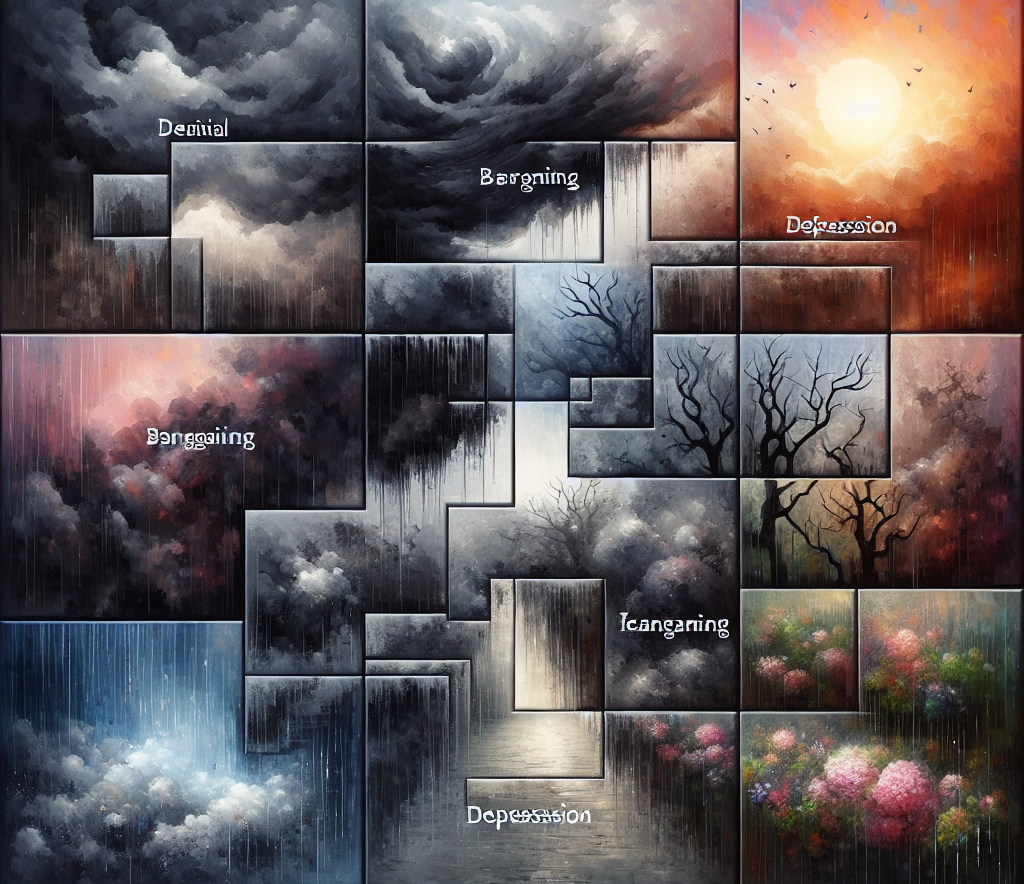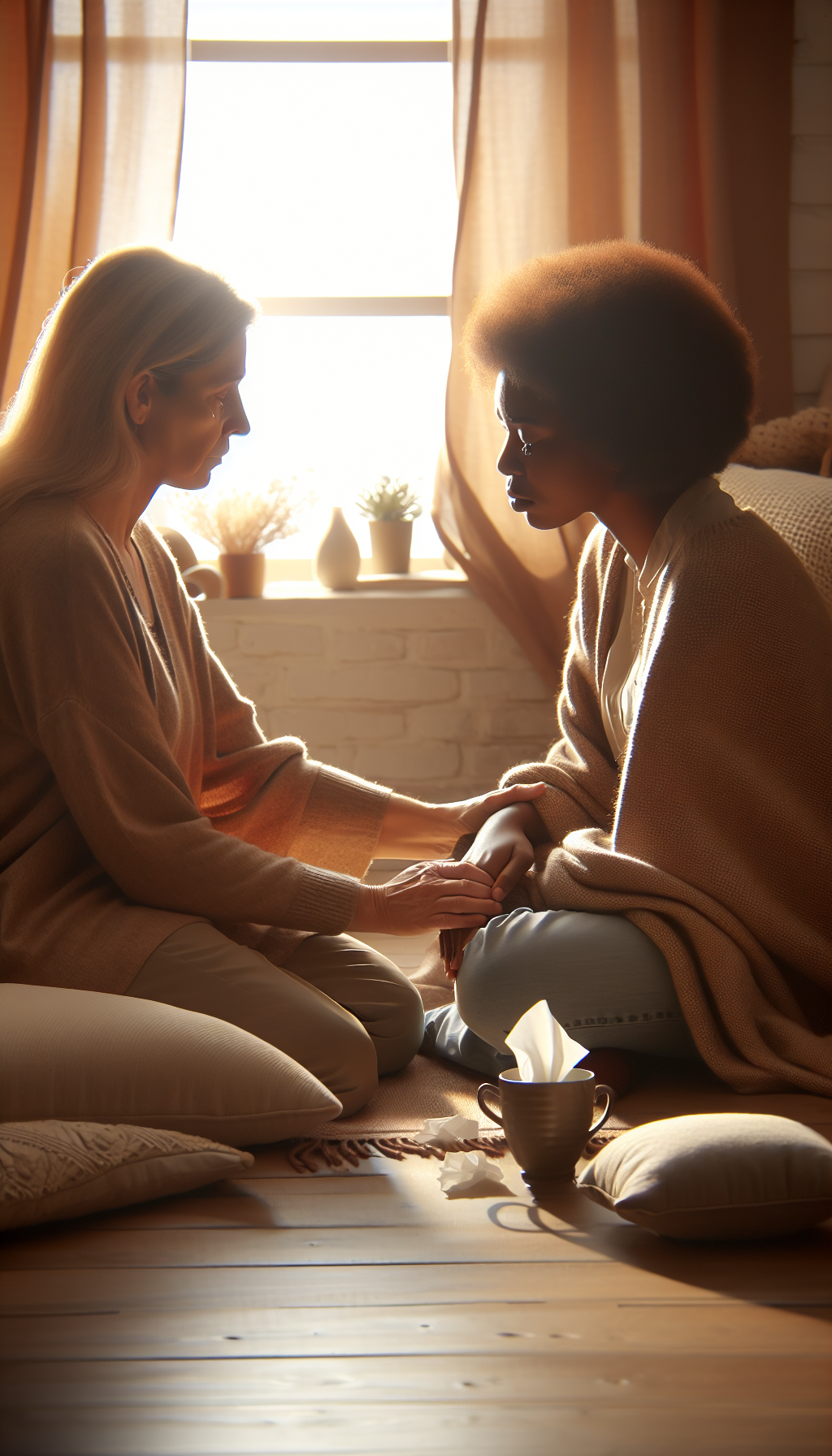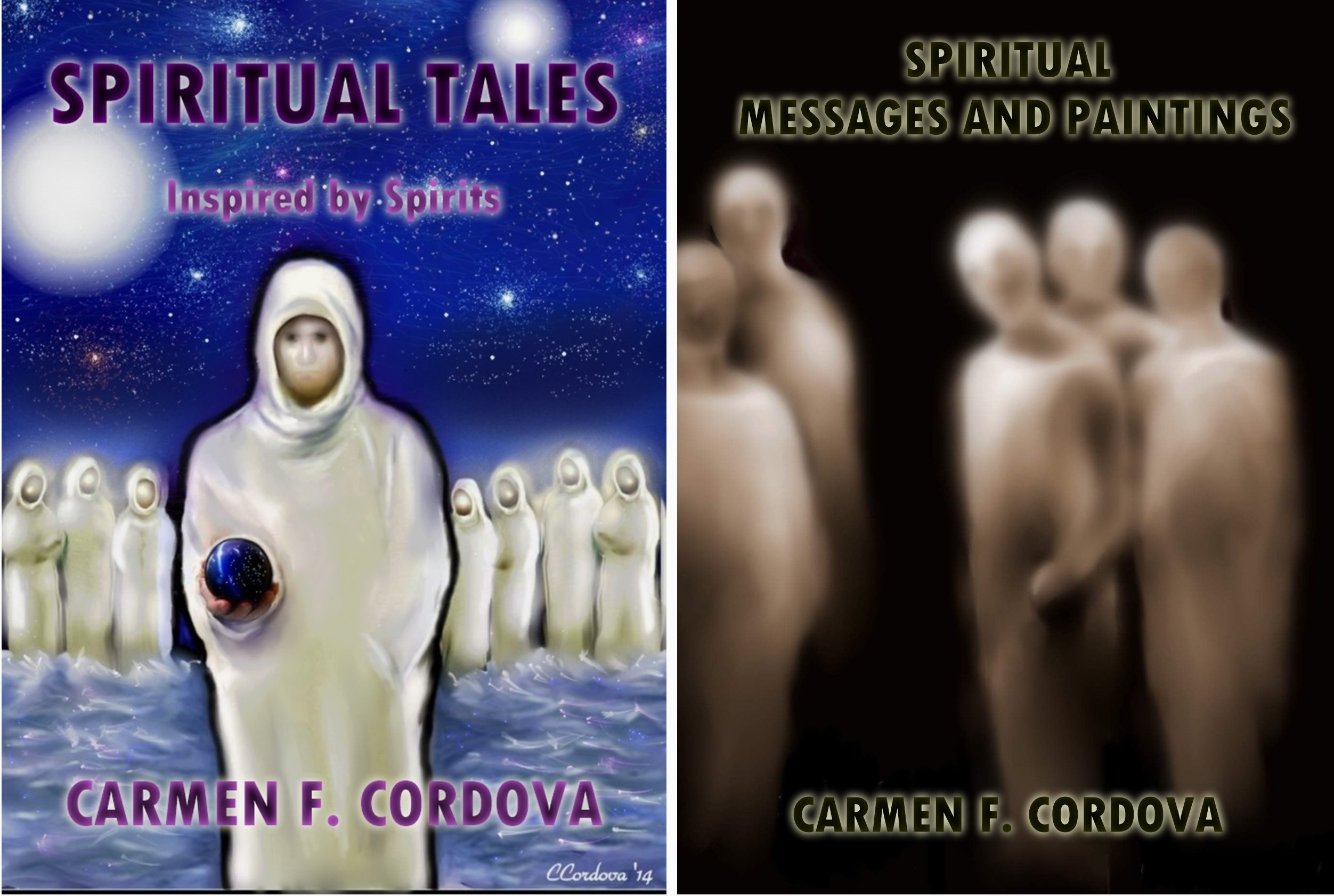What is the Grief Process?
What is the Grief Process and the Death Process?
 What is the Grief Process? Anticipatory grief - Letting Go
What is the Grief Process? Anticipatory grief - Letting GoThe grief process involves a range of emotional and physical reactions. These grief symptoms can vary greatly in intensity and duration, often influencing daily life and requiring professional support if they persist. Understanding these grief symptoms is crucial for navigating through the different stages of grief.
Whether it is anticipatory grief or complicated grief, the emotional inner pain is undeniably intense.
Experiencing The Loss of a Loved One
Have you ever endured the painful experience of losing a family member, friend, or pet? How did you feel during that time? Did you experience intense sadness, anger, or other confusing emotions? Did you have difficulty sleeping or focusing on your daily life?
You are not alone. Many people who have experienced a loss have gone through similar feelings and emotions. This is known as the process of grieving.
I have experienced everything mentioned above, and I can assure you that the emotional pain and the overall experience are unlike any other.
The grief experience is so intense that medication, words, and other remedies cannot take away the painful emotions.
Although some individuals might experience absent grief, where they do not show outward signs of mourning despite grappling with complex emotions internally, their pain is real.
All you want to do is sleep and hope to wake up to realize it was just a nightmare.
The first few days are the worst. However, the pain gradually decreases as time passes.
I am so grateful to my faith in God and HIS/HER spirit messengers for helping me face each day a bit better.
Although the loss never leaves, GOD gives you the strength to go on with the hope that we will meet again one day.
The above account is from my personal experience. However, I am aware that each person experiences feelings of grief differently.
Nevertheless, the grieving process is very real.
Loss of a Pet
 complicated grief
complicated griefAlthough I am not a pet owner, I understand the deep bond that people share with their pets. When a pet passes away, many individuals feel devastated and experience a grieving process similar to that of losing a human loved one. It is important never to dismiss the feelings of those who have lost a pet, as their pain is valid and profound.
The Grieving Process
There is no right or wrong way to experience grief. Not everyone experiences the grieving process the same way. Some individuals might experience delayed grief, where emotional responses to the loss occur days, weeks, or even months later. It comes with different emotional symptoms which differ from one grieving person to another.
Those experiencing prolonged grief or developing a mental health condition may need assistance. A mental health professional can assist with intense emotions, the denial stage, feelings of anger and sadness, and the understanding of grief.
If you are suffering from a prolonged grief disorder- experiencing sadness, feeling guilty, or feeling angry, reach out to support groups, grief counseling, or a clinical psychologist.
In the early stages of the grieving process, everything can feel overwhelming. But as time goes on, things will get better.
What is Grief?
Grief is a natural response to loss, characterized by emotional suffering and a range of difficult emotions, including shock, anger, guilt, and profound sadness. It can disrupt physical health and daily life and is a universal experience that can be triggered by any significant loss. Grief is the experience of coping with loss, which can be associated with the death of a loved one, a pet, etc.
Types of Grief
There are various types of grief, including:
- Anticipatory grief: Grief experienced in anticipation of a loss, often seen in individuals with terminal illnesses.
- Acute grief: Sudden and intense grief experienced after a significant loss.
- Chronic grief: Ongoing and persistent grief that lasts for an extended period.
- Disenfranchised grief: Grief experienced by individuals who are not recognized or validated by others, such as those who experience the loss of a pet or a non-traditional relationship.
- Complicated grief: Grief that is intense, prolonged, or interferes with everyday life.
- Intergenerational grief: Grief experienced by individuals who have a family history of trauma or loss.
- Collective grief: Grief experienced by a community or society as a whole, often in response to a shared traumatic event.
- Traumatic grief: A severe and prolonged reaction that occurs when the loss is unexpected and violent.
The Five Stages of Grief

Dr. Elisabeth Kübler-Ross first introduced the five stages of grief in her 1969 book, “On Death and Dying.” These stages of grief offer a framework for understanding the complex thoughts, behaviors, and emotions of losing a loved one. It is important to note that these stages are not fixed; individuals may experience them differently and not necessarily in the same order.
Stage 1: Denial
Denial is a common defense mechanism used to numb the intensity of a situation. It can be a coping mechanism that gives you time to absorb the news and begin to process it. Denial can be a temporary stage of grief, but it can also be a recurring stage. Denial can be a way to avoid feelings of sadness, confusion, or hurt.
Stage 2: Anger
Anger is a natural response to the loss of a loved one. It can be directed toward oneself, family members, doctors, God, or even the deceased. Anger is a manifestation of grief and can present itself in various ways. Anger can be a way to regain control or feel like you can affect the outcome of an event. Anger can be a stage of grief that can be intense and overwhelming.
Stage 3: Bargaining
During the bargaining stage, we may find ourselves making irrational agreements or “what if” statements in an attempt to negotiate for a different outcome. Bargaining offers a perceived sense of control over an uncontrollable situation, which can temporarily ease the grief.
Stage 4: Depression
The depression stage is marked by deep sadness and a withdrawal from social interactions. As the emotional fog begins to clear, we start to process the full weight of our loss, often experiencing a profound sense of grief and confusion.
Stage 5: Acceptance
Acceptance, the final stage of grief, does not mean moving on but rather adjusting to life without a loved one. It involves recognizing the new reality and discovering ways to coexist with it, which can foster personal growth and resilience.
When Death is Inevitable
Death is a reality. A reality we cannot escape or avoid.
It does not matter a person's socioeconomic status, nationality, race, or religious beliefs.
Death does not discriminate; it waits patiently for the right moment to enter our lives. Everyone has an expiration date.
Does the Soul Die?
Many individuals believe that the soul continues to live on while the body dies. It is a transition from one form of energy to another.
Therefore, when we leave the body and transform into our true being, we are reunited with those we mourned during our stay on Earth.
If Dying is Reliving, why do We Cry for Our Loved Ones?
If dying is not the end but the beginning, why do we cry and pray desperately for a miracle?
Why do we question God when a miracle does not manifest?
When a loved one is suffering from a terminal illness. why do we continue to cling to the dying person and refuse to accept the impending truth that death is near?
Why is it so difficult for us to let go of a loved one who is dying?
Isn't death freedom? To be free from the earthly shackles that keep the incarnate spirit confined to the body.
So, why do we cry?
 Grieving and Healing Process
Grieving and Healing ProcessGrieving Process Comment
Someone shared the following statement concerning the questions mentioned above.
"When a loved one dies, we often cry for different reasons.
"Some people cry because they feel as though a part of themselves has been taken away, as if a piece of their own life has also ended.
"Others shed tears out of guilt. They feel guilt and remorse for what they believe they could have done differently while the person was alive.
"Some people cry out of feelings of abandonment and loneliness. They often say things like, "What will I do without them?" or "How will I survive without them?"
"Then there are those who weep because, on an unconscious level, they understand that their loved ones' earthly journeys have come to an end, allowing them to return home while they remain burdened by various earthly struggles. I believe these individuals are crying for themselves.
"Additionally, some people cry because they do not believe in an afterlife and feel that death is a finality.
"Regardless of the reason, the experience is devastating."
Anticipatory Grief
Holding on to a Loved One Who is Dying
 anticipatory grief -letting go by Tai
anticipatory grief -letting go by TaiIt is crucial to recognize that when someone holds onto a dying loved one with desperation, it can negatively impact the loved one's peaceful passing. The awareness of their loved one's distress may hinder their ability to let go and find peace.
Therefore, it is essential to approach the situation with care and support, understanding the significance of allowing the dying person to transition peacefully and in their own way.
According to Sogyal Rinpoche, author of The Tibetan Book of Living and Dying, "...you can bring him or her a lot of unnecessary heartaches...the dying person can linger on many months or weeks longer than doctors expected and experience tremendous physical suffering."
Additionally, Sogyal Rinpoche believes that for the dying person to let go and die peacefully, their loved ones should, "...give the person permission to die, and...reassure the person they will be all right after he or she has gone, and that there is no need to worry about them."
The Separation of Body and Soul
 spiritual beliefs by Tai
spiritual beliefs by TaiAfter a person's spirit departs their physical body, they are liberated from all earthly worries and physical limitations.
They are free of all Earthly afflictions.
The spirit is set free to journey to a spiritual realm where it can reunite with loved ones who have previously passed away, experiencing a time of great joy and celebration.
After a period of regeneration and spiritual healing, the spirit is allowed to visit us. Just because we cannot see them as we did before does not mean they are not present.
They can see and hear us better than before.
They have not forgotten us. Their unwavering affection for us is even stronger than before.
We are not alone.
Letting Go
Saying Goodbye for Now
 by Tai
by TaiWhen a loved one is approaching the end of their life, it is important to release them and allow them to depart peacefully.
Give them permission to journey back home and reassure them that the separation is only temporary.
Remember, the Final Goodbye is never truly final, as we will one day be reunited.
It's important to note that "farewell" is not appropriate for temporary separations.
A more fitting phrase to use is "until we meet again."
Helping Someone who is going through the Grieving Process
 Help with complicated grief
Help with complicated griefSupporting someone who is grieving involves acknowledging their loss and being present.
While you can't take away their pain, you can offer comfort and lend a listening ear.
I know from personal experience how overwhelming and debilitating the emotional pain of losing a loved one can be.
However, having a dear friend stand by my side during those tough times helped me tremendously.
Simply having her presence felt like a lifeline and made me feel less isolated.
Grieving Process Quotes
 image by Tumisu from Pixabay
image by Tumisu from Pixabay1. “The reality is that you will grieve forever.
You will not ‘get over’ the loss of a loved one; you will learn to live with it.
You will heal and you will rebuild yourself around the loss you have suffered.
You will be whole again but you will never be the same.
Nor should you be the same nor would you want to.” — Elisabeth Kubler-Ross
2. "There are no good-byes for us.
Wherever you are, you will always be in my heart." – Ghandi
3. "Death is nothing at all.
I have only slipped into the next room.
I am I, and you are you, and the old life that we lived so fondly together is untouched, unchanged.
Whatever we were to each other, that we are still.
Call me by the old familiar name.
Speak to me in the easy way which you always used. Put no difference in your tone.
Wear no forced air of solemnity or sorrow.
Laugh as we always laughed at the little jokes we enjoyed together.
Play, smile, think of me, pray for me.
Let my name be ever the household word that it always was.
Let it be spoken without effect, without the ghost of shadow upon it.
Life means all that it ever meant. It is the same as it ever was. There is absolute and unbroken continuity.
Why should I be out of mind because I am out of sight?
I am waiting for you, for an interval, somewhere very near, just around the corner.
All is well. Nothing is hurt; nothing is lost. One brief moment and all will be as it was before.
How we shall laugh at the trouble of parting when we meet again!
Henry Scottt Holland
4- When a person passes away, their spirit lives on, surrounding us and living within our memories. Take comfort in the knowledge that you will one day meet again.
5- Death is merely a transition from one state of being to another.
Author
 Saying Goodbye to Your Beloved Pet
Saying Goodbye to Your Beloved PetSummary
There are various stages of grief. Whatever stage you feel stuck in, seek help. You don't have to go through this alone.
There are many mental health resources and support groups ready to assist you with coping skills.
It is okay to feel sad. And it is OK to feel overwhelmed at times. However, it is essential to spend time taking care of yourself and maintain a state of well being.
During the grieving process, spirits of light are with you. Remember, your loved one has not died, he/she has simply moved on to a different dimension.
When you are feeling sad, don't hesitate to seek support from friends and family, support groups or a grief counselor. In the long run, you will feel better.
Links
What is the grief process ?
Click below and views more than 600 pieces of spiritual artwork

Spiritual Books
If you enjoy the articles on this website, you will also appreciate the short stories in the books below. Click here and continue the journey.



